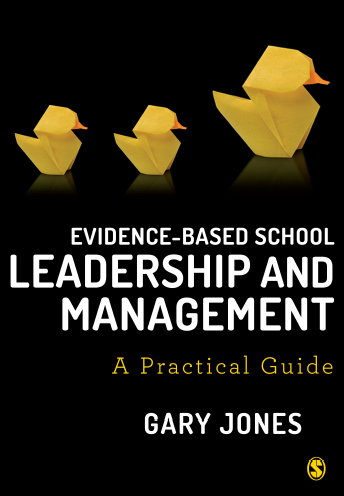FOREWORD by Professor Chris Brown, University of Portsmouth
When it comes to evidence-informed practice, Dr Gary Jones is a phenomenon. An ardent and assiduous blogger, unrelenting member of the twitterati and researchED stalwart, Gary’s efforts in getting the message across to educators and policy-makers that research use is the future for schools have in some cases been (to quote one tweet) ‘literally life changing’. With this book Gary has begun to flesh out and develop his ideas into a manifesto for change. And a timely manifesto it is too. As you are likely to be aware – indeed it is probably the reason that led you to pick up this book in the first place – evidence-informed practice in education is a hot topic, not only in England but worldwide. It is also fair to say that the current focus on evidence-informed teaching is justified. Recent studies have shown for instance that, when done well, collaborative research use by teachers can improve their confidence, resilience and pedagogy, enhance the professional discourse that occurs in schools and enable effective practice not only to be developed, but also shared and acted on widely. Vitally, however, effective engagement with research evidence by teachers has been shown to impact positively on student outcomes (most notably at Key Stage 2).
Despite these benefits, the current focus on encouraging teachers to engage with research evidence and, of course, the moral argument that teachers should always try to ensure they are abreast of and employ what is currently known to be effective, we are not yet at the point where we have an evidence-informed schools system (neither here or elsewhere in the world). The reasons for this are manifold and include well-rehearsed arguments regarding: the use, value and applicability of much research; teachers’ ability to access research – not only because much of what academics and universities produce is stored behind paywalls, but also because of the language in which it is written; mismatches in research priorities (with academic interests not always coinciding with those of teachers, schools and policy-makers); and the generalisability of much education research, which often is qualitative in nature or focuses on small numbers of cases. These issues are not insurmountable however, and Gary’s book does a sterling job in helping teachers and school leaders navigate through many of them. In particular and vitally, it provides an accessible way for educators to understand and engage critically with research and other pertinent evidence. Most helpfully perhaps, Gary has provided crucial guidance on how we can understand research quality and what warrants for action we can truly make from different forms of research.
Gary’s work also goes beyond what much of the literature in this area focuses on, however. Knowing the vital but often indirect importance of school leadership for pupil outcomes, as well having an acute understanding of the many ways leaders can improve on how they make decisions, Gary highlights that, more than just evidence-informed practice, school leaders should be fostering, encouraging and engaging in evidence-informed decision-making more generally. This book therefore serves to broaden the evidence-informed horizon in ways many others have currently failed to do. Considering leadership in the round therefore, the implications of Gary’s work are that, whatever our position in school and whatever responsibilities we have in addition to teaching, we should be continuously considering whether and how we can engage with colleagues more effectively through engaging with pertinent and high-quality research-evidence.
Of course, only time will tell if those who believe in the power of research use can ensure evidence-informed decision-making will end up as the norm, but as more and more schools become academies or become part of multi-academy trusts, it seems sensible that with the freedom to make decisions and innovate that this entails, that schools should attempt to do so as effectively as possible. I commend Gary for the way he has gone about writing this book, the intention behind it and its helpfulness and accessibility. It has been a joy to see it come to fruition and I hope you enjoy reading it as much as I have.
Professor Chris Brown
University of Portsmouth
